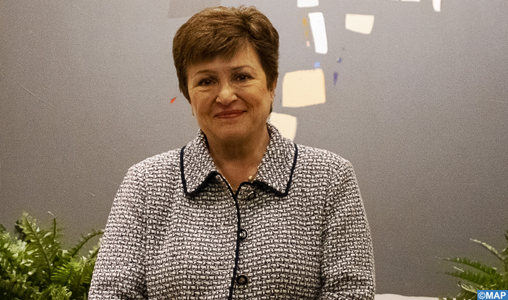
During the interview, Ms. Georgieva explained: “In January, we lowered our global growth forecast to 4.4% for 2022. Since then, the outlook has deteriorated significantly, largely due to the war and its aftermath.” Carnegie Endowment for International Peace in Washington.
“Inflation, fiscal tightening and frequent large-scale shutdowns in China, which are creating new bottlenecks in global supply chains, are also affecting economic activity,” the IMF Managing Director continued.
Thus, she said, the Russian-Ukrainian conflict and its repercussions forced the International Monetary Fund this year to revise downward growth forecasts for 143 countries, representing 86% of global GDP.
“Fortunately, the growth rate will remain positive in most countries,” Ms. Georgieva noted during this intervention that serves as a prelude to the publication of the International Monetary Fund’s “Global Economic Prospects” next week at the IMF and World Bank Spring Meetings.
“Among the countries affected by these downward revisions are net importers of food and fuel, in Africa, the Middle East, Asia and Europe,” the Bretton Woods Foundation president noted, adding that higher commodity prices had improved the growth prospects for many exporters of oil, natural gas and minerals.
She noted that “greater uncertainty hangs over these countries, and their gains are not close enough to offset the general slowdown in the global economy, largely due to the war.”
At the same time, the CEO of the International Monetary Fund pointed out that rising energy and food prices are adding to inflationary pressures, putting pressure on the real income of households around the world.
“Food insecurity is a major concern,” she said, and called for a “multilateral initiative” to address the problem.
“Not to do so would be appalling: more hungry people, more poverty and more social unrest, especially in countries that have struggled for many years to escape fragility and conflict,” she warned.
Georgieva noted that before the war, Russia and Ukraine accounted for 28% of world wheat exports, and Russia and Belarus 40% of potash exports, which is an essential fertilizer. “The prices of grain and corn are skyrocketing today, and leaders in Africa and the Middle East are telling me their supplies are running low,” she warned.
In the face of these risks, international cooperation is the only effective solution. Our only hope is to create a more equitable and resilient future. And this is our duty,” concluded the head of the International Monetary Fund.

“Hipster-friendly coffee fanatic. Subtly charming bacon advocate. Friend of animals everywhere.”





More Stories
Israel: Shocking revelation from survivors of Hamas massacre at festival – 'Nearly 50 people killed themselves'
A father cuts his daughter's long hair because she does not want to comb it twice a day Marie Claire
Ukraine abruptly pulled out of an impending deal with Russia over the Black Sea